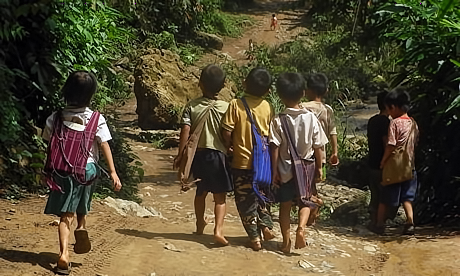Recently I had a great opportunity to know the reality of migrants from Myanmar living on the Myanmar-Thai border.
In Ranong, I taught English in a learning centre and I was amazed by the children’s interest in learning and by their respect for their teachers.
I also realized that learning English and Thai can make the difference for them in having and not having “a future”.
I was also able to work with the HIV Project.
Our help is integral but, what the patients value most is to know that somebody cares for them.
I could see how a terminal patient felt relieved and calm after our visit.
We did very little during our short visit, but for that person we brought relief.
He died less than 48 hours later.
The last part of my experience was the visit to three refugee camps in the Northwest of Thailand. The life in the refugee camp is very tough.
- the refugees cannot get out of the camp,
- nor go freely into Thailand
- they cannot farm nor work
- they have no money and almost no rights
- they depend on UNHCR and other NGO’s
- their life is monotonous and without attraction.
It seems they do not exist, and are trapped in the middle of the jungle.
Two camps have dormitories for children whose parents have gone back to Myanmar but the children remain to study.
During our farewell, one boy with whom I had had a nice chat asked me:
‘Will you remember me?’
‘Yes, I will,” I replied.
“Good, because I’ll remember you’, he said.
‘Will you pray for me? ‘, he asked again.
‘Sure,’ I replied.
‘Good, I’ll pray for you too,’ he added.
Lastly, he asked me, ‘Will you miss me?’
Then, with my heart touched, I replied, ‘yes, I’ll miss you’.
How big has to be your longing for appreciation, for attention, for acknowledgement in order to ‘beg’ a stranger to miss you?
In this moment I realized what it is like to be a refugee: they feel abandoned and ignored.
These people need many things, especially good education and basic resources, but I have realized that the only thing I could do for them now is to keep their memory alive and their voice loud and not to allow our memories and consciences rest until they will be able to return to their real home.
For these are the lowly ones; those of whom Mary foretells in the Magnificat that were lifted up by the Lord (Lk 1,52). They should be the most important because they are the least ones.
– Daniel Fernandez
A Marist seminarian studying Theology in Rome was with the Marist Mission Ranong on mission placement during the Italian summer break.
